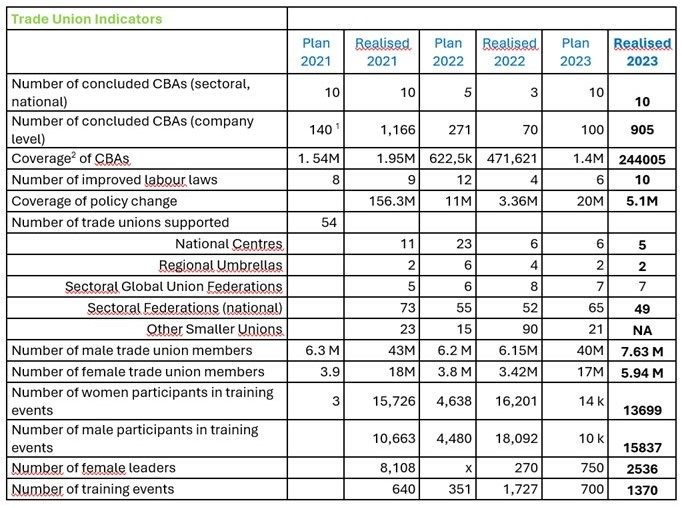Overview of Programme Results and Reach
Trade Union Co-financing Programme
Mondiaal FNV receives funds from the Trade Union Co-financing Programme (TUCP). This is a Dutch Ministry of Foreign Affairs programme, and its aim is to strengthen trade unions in low- and middle-income countries. Below we present an overview of results and reach of the programme.

Through TUCP, Mondiaal, FNV supports UHISPAWU, the union for workers in the flower industry in Uganda. Photo: Jan Banning.
The trade union indicators for 2023 are presented below:
Main outcomes
In 2023, 8 sectoral CBAs (Collective Bargaining Agreements) are reported from MENA (SD), Somalia (JT), Bangladesh (SD) and East Africa (construction) and from two countries national and lower-level bipartite agreements between trade unions and employers are reported: from Nepal (covering provincial dialogue mechanisms, SD) and from Somalia (social dialogue mechanisms at state level, below the federal level).
The coverage of CBAs at sector level was 15,225, excluding the bipartite agreements that are preparing for national tripartite policy changes (to avoid double counting); The coverage of the 905 company level CBAs is 228,780, with the largest number from Indonesia's Gender Equality programme (over 111 thousand), social dialogue in Ethiopia (51 thousand) and fruits and vegetables in Peru (over 38 thousand).
Policy change was reported from Somalia (formalisation of social dialogue), Ethiopia (Private Employment Agency Guideline), South Asia (2 new countries as signatories to the Hong Kong shipbreaking convention), India (social security), Nepal (social security), Indonesia (provincial level changes related to gender-based violence and job security), and two MENA countries.
Social security changes in India easily affect 400 million people, and the social security change in Nepal affects the rights of some 15 million informal workers. These numbers are additional to the 5.1 million people benefiting from the other policy changes mentioned in the table, as these very large numbers are considered as outliers.
Trade union numbers
The statistics of trade unions supported by Mondiaal FNV show a slight decrease in the number of national trade union centres being supported from six to five: Ethiopia (CETU), Uganda (NOTU), Rwanda (CESTRAR), Somalia (FESTU), Nepal (JTUCC). Cooperation with CUT in Colombia ended as our support shifted to the Palm Oil Unions Cooperation Platform.
Through the social dialogue programme, Mondiaal FNV supports two regional umbrellas of trade unions: EATUC in East Africa and SARTUC in South Asia.
Mondiaal FNV works with seven sectoral global union federations:
- BWI in the construction and forestry sector for the construction programme;
- IUF (hotels, tourism, food and agriculture) for our work on flowers and palm oil;
- and several others in the social dialogue and just transition programmes in MENA, South Asia and Indonesia, among others: PSI (public sector), IndustriALL (manufacturing, industry and mining), UNI (services), EI (education), ITF (transport).
Through these GUFs, Mondiaal FNV supports around 40 sectoral federations. Mondiaal FNV also supports the following national sector organisations at bilateral level: STECOMA (construction, Rwanda), EIFCMWCOTU (Ethiopia), UHISPAWU (flowers, Uganda), NFFPFATU (flowers, Ethiopia). Some other industry associations are supported via foundations (NGOs), the so-called Labour Resource Organisations (LROs), including the local textile and leather sectors in Bangladesh, the palm oil unions in Indonesia, most Indian partners and FENTAGRO in Peru's agricultural export sector.
In total, the partners we support have 41.14 million male members and 20.92 million female members. As we consider the 33.4 million male and 14.9 million female members represented in the Alliance for Social Security in India to be an outlier, the remaining 7.63 million male and 5.94 million female members are included in the table. This is consistent with our reporting from last year. In East Africa, we continue to work with the East African Trade Union Centre (EATUC), which has over 2.6 million male and almost 2.2 million female members, including NOTU and CESTRAR members in Uganda and Rwanda. Follow-up projects with these two trade union centres were launched in the course of 2023.
Output
At 1370 training events, our trade union and LRO partners reported a total of 15837 male participants and 13699 female participants, an average of 46.3 % women.
The number of training sessions reported from Bangladesh is very high (1000), as many smaller training events have to be squeezed into the long working days of trade union members in the local textile manufacturing and leather industries. Other larger training numbers are reported from the seed programme in South Asia (76) and from the palm oil sector in Indonesia (75), as well as 27, 22 and 20 events from social dialogue in Ethiopia, social dialogue in MENA and gender equality in Indonesia respectively.
The figures on female leadership in the partner unions are not yet very accurate or comparable. The absolute figures and the percentage of female leaders per union are therefore more an indication of the extent of the problems than a measure of programme performance. Unfortunately, Mondiaal FNV has had to postpone the gender audit planned for 2024 until 2025. The number of women leaders reported as 'top level' is 2536, of which 1671 were reported by the Indonesian partners of the gender equality programme (where 3864 male leaders were also reported); a large number are also reported by the flower unions in East Africa (454), Somalia (120) and the Indonesian palm oil unions (88).
